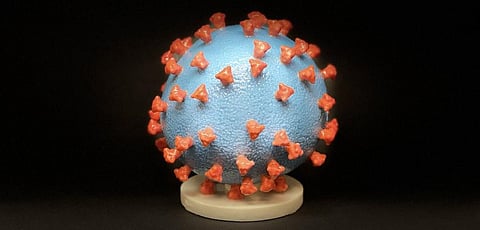The great coronavirus drug hunt
When you have a global health emergency as scary as the novel coronavirus — World Health Organization has named it COVID-19 — the sensible approach is to find out if existing medicines can be used to treat the killer disease, either singly or in combination with others. Developing a new drug can take years, by when the killer virus would have wreaked havoc on vulnerable populations.
News reports say several dozen clinical trials are under way in China in a frantic effort to contain the rising death toll and protect infected patients.
Amidst the scramble to find a cure, the Institute of Virology in Wuhan, the nucleus of the COVID-19 outbreak, has stolen a march by filing a patent for a drug that combines Gilead Sciences’ experimental antiviral drug remdesivir along with chloroquine which is used to fight malaria.
It was filed on January 21 after the institute, one of the most advanced virology centres globally, conducted studies along with other top Chinese research organisations and found it effective in lab tests against COVID-19. Its findings have been published in the journal Cell Research.
Remdesivir was developed by Gilead some years ago against the Ebola virus but did not prove very effective.
However, a 2017 study by the US National Institutes of Health (NIH) found that the compound was effective in preventing MERS (Middle East respiratory syndrome), which belongs to the same virus group as COVID-19. Because of this, Gilead provided remdesivir to China to conduct its own human trials.
The patent filed by the Wuhan institute on their cocktail of remdesivir and chloroquine raises some prickly questions. The latter has been in use for over 70 years but remdesivir is new and protected. Gilead officials claim that the company owns “all patents around remdesivir, including for coronaviruses”.
But in a bracing change from the norm, the US-based drug giant says it will not get into a patent dispute; its focus is on rapidly determining how effective remdesivir is in treating COVID-19 and to step up production thereafter.
However, reports from China say Gilead had applied for a patent in China in 2016 but it is for methods to treat coronavirus infections and does not mention remdesivir specifically.
With such a generous commitment from Gilead, China, too, is treading carefully. It has promised that temporarily it will not exercise any intellectual property (IP) rights “if foreign pharmaceutical firms are willing to contribute towards combating the outbreak in China”.
So why did the Wuhan institute file a patent claim? Officials clarify that this is in line with the global practice and is also to “protect national interest”.
China’s confidence is probably based on the fact that its application is for a new combination therapy of remdesivir and chloroquine which might meet the requirements of innovation and novelty as patent claims must do.
But there is yet another twist in the tale. The Chinese have also been working on copying remdesivir and have succeeded in making a generic version.
But here, too, they have promised to wait for permission from Gilead, probably licensing rights, before marketing it. Hopefully, the bonhomie between the US and China which have been at loggerheads over IP will last beyond the current emergency.


